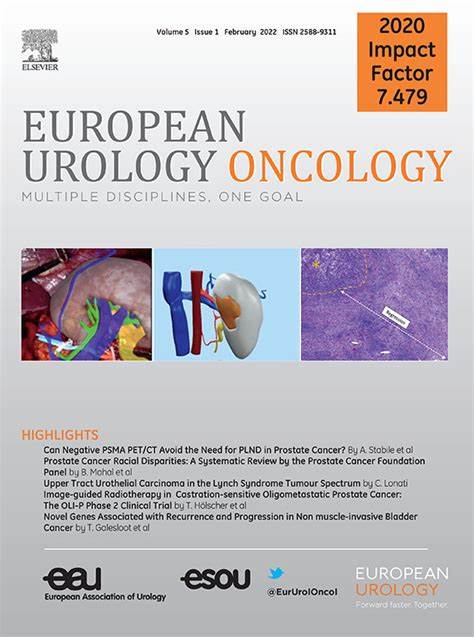Management of Small Testicular Masses: A Delphi Consensus Study
IF 8.3
1区 医学
Q1 ONCOLOGY
引用次数: 0
Abstract
Background and objective
The majority of small testicular masses (STMs) are benign and therefore radical orchidectomy (RO) may represent overtreatment. In appropriately selected patients, surveillance or testis-sparing surgery (TSS) is an alternative option to preserve testicular function. Since there are no clear guidelines, we aimed to develop consensus recommendations on the management of STMs.
Methods
A four-round Delphi study was conducted by 24 experts representing multiple subspecialties to reach consensus. Consensus was defined as ≥75% of the participants scoring within the same 3-point grouping (1–3, disagree; 4–6, uncertain; 7–9, agree.). The first two rounds were survey based, the third round was an online meeting to discuss uncertainties from the first two rounds, and the fourth round was a review of the final consensus statements from rounds 1–3.
Key findings and limitations
The initial survey consisted of 126 statements. Following the four rounds of assessment, a list of 96 statements were produced, which focused on clinical and biochemical assessment, colour Doppler ultrasound (CDUS) characteristics, and management options including surveillance, RO, and TSS. Management should be personalised according to risk factors for testicular cancer, fertility status, uni- or bilateral tumours, status of the contralateral testis, and CDUS characteristics, with solid lesions displaying vascularity and hypoechogenicity being more suspicious for malignancy. The consensus statements are prone to a bias, and some may not reflect robust, randomised evidence.
Conclusions and clinical implications
The expert panel has produced consensus recommendations on the management of STMs, and TSS should be considered in patients with an STM. The recommendations could aid in the dissemination of best practice.
Patient summary
There are no clear guidelines on the management of small testicular masses. Excising the whole testicle (radical orchidectomy) with a small or an indeterminate mass may affect fertility and hormonal function. A panel of experts was formed, and consensus recommendations were developed on how to deal with small and indeterminate testicular masses, which include surveillance or testis-sparing surgery.
小睾丸肿块的处理:德尔菲共识研究
背景和目的:大多数小睾丸肿块(STMs)是良性的,因此根治性睾丸切除术(RO)可能代表过度治疗。对于经过适当选择的患者,监视或保留睾丸手术(TSS)是保留睾丸功能的另一种选择。由于目前尚无明确的指导方针,我们旨在就STMs的治疗制定共识性建议:方法:代表多个亚专科的 24 位专家进行了四轮德尔菲研究,以达成共识。共识的定义是≥75%的参与者得分在相同的3点分组内(1-3,不同意;4-6,不确定;7-9,同意)。前两轮以调查为基础,第三轮为在线会议,讨论前两轮中的不确定因素,第四轮是对第一至三轮的最终共识声明进行审查:最初的调查包括 126 份声明。经过四轮评估后,形成了一份包含 96 项声明的清单,主要涉及临床和生化评估、彩色多普勒超声(CDUS)特征以及包括监测、RO 和 TSS 在内的管理方案。应根据睾丸癌的风险因素、生育状况、单侧或双侧肿瘤、对侧睾丸的状况以及 CDUS 特征进行个性化管理,其中显示血管和低栓塞的实性病变更可疑为恶性。共识声明容易出现偏差,有些可能并不反映可靠的随机证据:专家小组已就 STM 的管理提出了共识建议,STM 患者应考虑 TSS。这些建议有助于最佳实践的推广。患者总结:目前尚无关于小睾丸肿块治疗的明确指南。对于小肿块或不确定的肿块,切除整个睾丸(根治性睾丸切除术)可能会影响生育能力和激素功能。我们成立了一个专家小组,并就如何处理小的和不确定的睾丸肿块提出了共识性建议,其中包括监视或保睾手术。
本文章由计算机程序翻译,如有差异,请以英文原文为准。
求助全文
约1分钟内获得全文
求助全文
来源期刊

European urology oncology
Multiple-
CiteScore
15.50
自引率
2.40%
发文量
128
审稿时长
20 days
期刊介绍:
Journal Name: European Urology Oncology
Affiliation: Official Journal of the European Association of Urology
Focus:
First official publication of the EAU fully devoted to the study of genitourinary malignancies
Aims to deliver high-quality research
Content:
Includes original articles, opinion piece editorials, and invited reviews
Covers clinical, basic, and translational research
Publication Frequency: Six times a year in electronic format
 求助内容:
求助内容: 应助结果提醒方式:
应助结果提醒方式:


